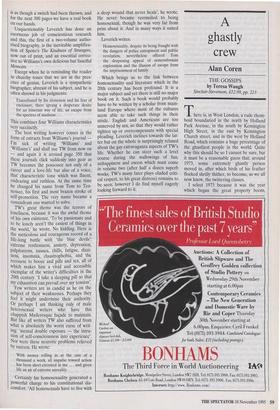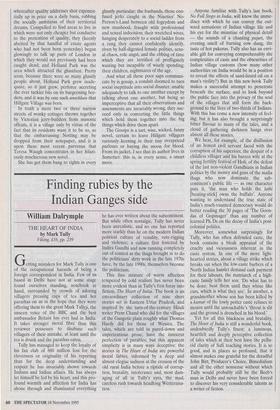A ghastly crew
Alan Coren
THE GOSSIPS by Teresa Waugh
Sinclair-Stevenson, £12.99, pp. 213
There is, in West London, a rude rhom- boid boundaried in the north by Holland Park Avenue, in the south by Kensington High Street, in the east by Kensington Church street, and in the west by Holland Road, which contains a huge percentage of the ghastliest people in the world. Quite why this should be so I cannot be sure, but it must be a reasonable guess that, around 1973, some extremely ghastly person moved in, after which birds of his feather flocked shrilly thither, to become, as we all now know, the twittering classes.
I select 1973 because it was the year which began the great property boom, whereafter quality addresses shot exponen- tially up in price on a daily basis, robbing the socially ambitious of their territorial dreams. Compelled to find areas to live in which were not only cheaper but conducive to the pretention of quality, they (keenly abetted by that handful of estate agents who had not been born yesterday) began glowingly to talk up parts of London in which they would not previously had been caught dead; and Holland Park was the area which attracted the ghastliest. Pretty soon, because there were so many ghastly people about, Holland Park grew inade- quate, so it just grew, perforce accreting the ever tackier bits on its burgeoning bor- ders, and it was by one such anschluss that Hillgate Village was born.
In truth a mere two or three narrow streets of wonky cottages thrown together by Victorian jerry-builders from masonic offcuts, it is a village only by virtue of the fact that its residents want it to be so, so that the embarrassing Notting may be dropped from their notepaper, and it is upon these most recent parvenus that Teresa Waugh concentrates in her hilari- ously mischievous new novel.
She has got them bang to rights in every ghastly particular: the husbands, those con- fused jerks caught in the Nineties' No- Person's-Land between old fogeydom and new manhood, fraught with professional and sexual indecision; their wretched wives, hanging desperately to a social ladder from a rung they cannot confidently identify, riven by half-digested female politics, sexu- al chaos, role angst, and the ebbing of time which they are terrified of profligately wasting but incapable of wisely spending; their children, nightmares of the age.
And what all these poor saps communi- cate by is gossip, a conduit doomed to turn social ineptitude into social disaster: unable adequately to talk to one another except by talking about one another, but being so imperceptive that all their observations and assessments are invariably wrong, they suc- ceed only in converting the little things which hold them together into the big things which drive them apart.
The Gossips is a tart, wise, wicked, funny novel, certain to leave Hillgate villmers variously keening in their tiny overpriced parlours or baying the moon for blood. From its jacket, I see that its author lives in Somerset: this is, in every sense, a smart move.



















































































 Previous page
Previous page